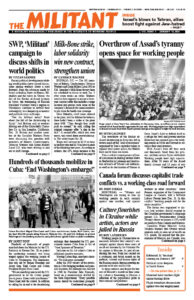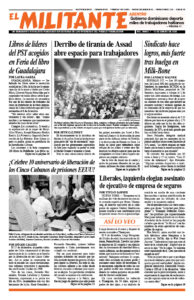LONDON — Hundreds of police, many heavily armed, raided the Kurdish Community Centre in Haringey, north London, and seven houses across the city Nov. 27, an attack on the rights of all working people. Kurds and their supporters protested outside the community center and in the local area that day, the next day and again in central London Dec. 1.
During the raids, cops deployed helicopters and drones, according to KCC leaders, broke down doors and caused injuries. The assault at the community center coincided with preparations there for an anniversary celebration of the founding of the Kurdistan Workers Party (PKK) in Turkey. The center was closed down by cops for nine days after the raid, breaching the right of assembly.
Six of the seven Kurds arrested in the raids were charged Dec. 10 with being members of the PKK, which has been banned in the U.K. since 2001.
The Kurdish people, numbering 30 million across Iran, Iraq, Syria and Turkey, are the largest nationality in the world without a homeland. Since the post-World War I carving up of the Middle East by the British and French imperialist rulers, the Kurds have been denied national rights. This is enforced today by the capitalist rulers in each country. Tens of thousands have sought refuge in the U.K. and elsewhere.
Prime Minister Keir Starmer’s Labour government is committed to maintaining the British rulers’ trade, political and military relations with the Turkish government, a bitter foe of the Kurdish people’s struggle for self-determination. During a Nov. 14 visit to Turkey, Defense Secretary John Healey vowed to deepen defense cooperation with Ankara. Thousands of Kurds have been killed since the PKK launched an armed struggle against Turkish government oppression in the early 1980s.
The six Kurds charged in London will not be tried until January 2026, a judge ruled Dec. 20. They face onerous bail conditions, including wearing an electronic monitor, observing a curfew, reporting to the cops each day and not visiting the community center or having contact with each other.
The cops’ evidence “mainly consists of documents and references to the defendants’ legal campaigning and advocacy work on the Kurdish issue,” their lawyer, Ali Has, told ANF News. “This raises serious concerns about the abuse of legal mechanisms to charge individuals for exercising their fundamental rights.”

